中考英语易混淆词汇辨析
- 格式:docx
- 大小:37.38 KB
- 文档页数:3
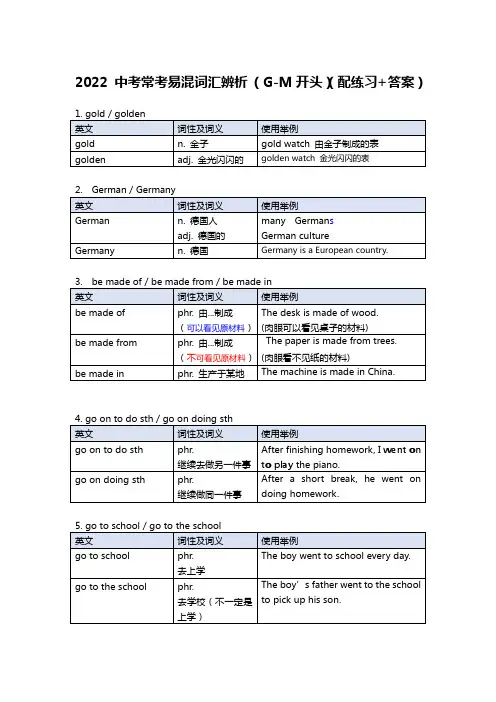
2022 中考常考易混词汇辨析(G-M开头)(配练习+答案)9. jeans/ trousers / pants/ shoes 等成双成对的词的主谓一致问题10. 【参加】的词组Practice1. The sun is shining. Don't look at the sun.A.gold; straightB.golden; straightlyC.golden; straightD.gold; straightly2. —Do you come from ?—No. But I can speak well.A.Germany; GermanB.German; GermanyC.Germany; GermanyD.German; German3. Students will make progress if they a subject.A.be made ofB.be made fromC.be made up ofD.be made in4. The kite is paper, and the paper is trees.A.made of; made fromB.made from; made ofC.made of; made inD.made from; made in5. It's getting dark, let's , shall we?A.go on to workB.go on workingC.to go on workD.to go on working6. Students to study. Their parents to pick them up.A.go to the school; go to the schoolB.go to school; go to schoolC.go to the school; go to schoolD.go to school; go to the school7. Boys and girls, time is up, please check your name and your papers.A.hand outB.hand upC.hand inD.hand down8. The hunter the fox, took off its skin and it on the tree.A.hung; hangedB.hung; hungC.hanged; hangedD.hanged; hung9. Our teacher often tells us different events that have strong influence on China.A.historic; historyB.historical; historicC.history; historyD.history; historic10. In order to have a better understanding of those places of interest, she read some books before the visit.A.historical; historicalB.historical; historicC.historic; historicalD.historic; historic11. Why don't you us to the speech contest?A.join; joinB.take part in; take part inC.take part in; joinD.join; take part in12. A is a long journey on a ship or in a spacecraft.A.tourB.voyageC.tripD.continent13. The boy's mother is . He has to look after his mother at home.A.bad; sickB.ill; badC.ill; sickD.sick; ill14. This year's Government Work Report many issues economic growth, environmental protection, etc.A.includes; includingB.include; includingC.is included; includeD.including; include15. Thousands of people lost their in the earthquake, so we should value our daily .A.lives; lifeB.life; lifeC.lives; livesD.life; lives16. Independence does not mean (shut)the door to the world.本章答案1-5 BACAB 6-10 DCDDC 11-15 DBCAA 16. shutting。
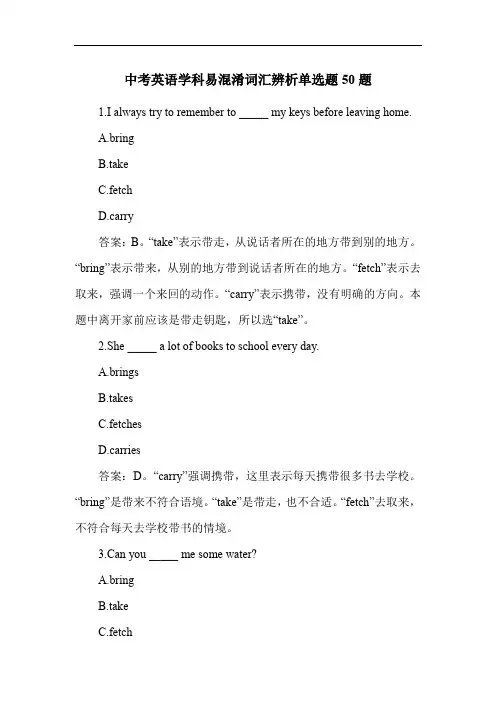
中考英语学科易混淆词汇辨析单选题50题1.I always try to remember to _____ my keys before leaving home.A.bringB.takeC.fetchD.carry答案:B。
“take”表示带走,从说话者所在的地方带到别的地方。
“bring”表示带来,从别的地方带到说话者所在的地方。
“fetch”表示去取来,强调一个来回的动作。
“carry”表示携带,没有明确的方向。
本题中离开家前应该是带走钥匙,所以选“take”。
2.She _____ a lot of books to school every day.A.bringsB.takesC.fetchesD.carries答案:D。
“carry”强调携带,这里表示每天携带很多书去学校。
“bring”是带来不符合语境。
“take”是带走,也不合适。
“fetch”去取来,不符合每天去学校带书的情境。
3.Can you _____ me some water?A.bringB.takeC.fetch答案:A。
“bring”表示带来,这里是让对方给自己带来一些水。
“take”带走不对。
“fetch”去取来,没有“bring”直接。
“carry”携带,不是此处的意思。
4.He went to the library to _____ a book.A.bringB.takeC.fetchD.carry答案:C。
“fetch”表示去取来,去图书馆取一本书符合这个意思。
“bring”带来,从图书馆的角度不是带来。
“take”带走,不太准确。
“carry”携带也不合适。
5.She _____ her baby in her arms.A.bringsB.takesC.fetchesD.carries答案:D。
“carry”表示携带,这里是她把宝宝抱在怀里,用“carry”合适。
“bring”带来不符合。
“take”带走不对。
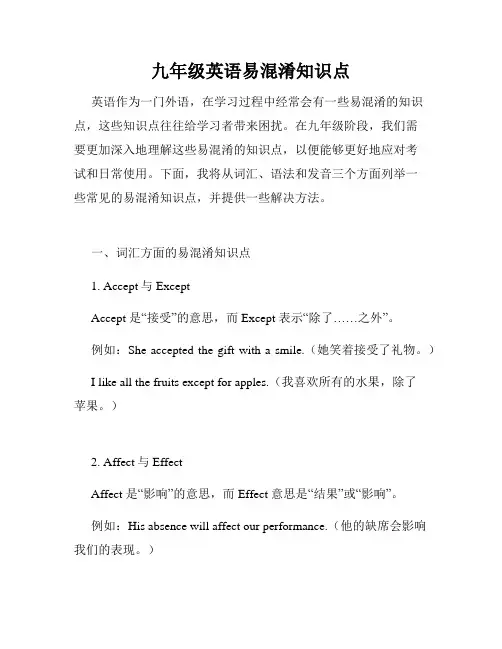
九年级英语易混淆知识点英语作为一门外语,在学习过程中经常会有一些易混淆的知识点,这些知识点往往给学习者带来困扰。
在九年级阶段,我们需要更加深入地理解这些易混淆的知识点,以便能够更好地应对考试和日常使用。
下面,我将从词汇、语法和发音三个方面列举一些常见的易混淆知识点,并提供一些解决方法。
一、词汇方面的易混淆知识点1. Accept与ExceptAccept 是“接受”的意思,而Except 表示“除了……之外”。
例如:She accepted the gift with a smile.(她笑着接受了礼物。
)I like all the fruits except for apples.(我喜欢所有的水果,除了苹果。
)2. Affect与EffectAffect 是“影响”的意思,而Effect 意思是“结果”或“影响”。
例如:His absence will affect our performance.(他的缺席会影响我们的表现。
)The medicine had a positive effect on her health.(这种药对她的健康有积极的影响。
)3. Desert与DessertDesert 是“沙漠”的意思,而Dessert 表示“甜点”。
例如:They took a trip to the desert.(他们去沙漠旅行了。
)I want some ice cream for dessert.(我想要一些冰淇淋当甜点。
)二、语法方面的易混淆知识点1. Much与ManyMuch 用于不可数名词,而Many 用于可数名词。
例如:He has much experience in this field.(他在这个领域有很多经验。
)There are many books on the shelf.(书架上有很多书。
)2. It's与ItsIt's 是 It is 或 It has 的缩写形式,而Its 是“它的”的意思。
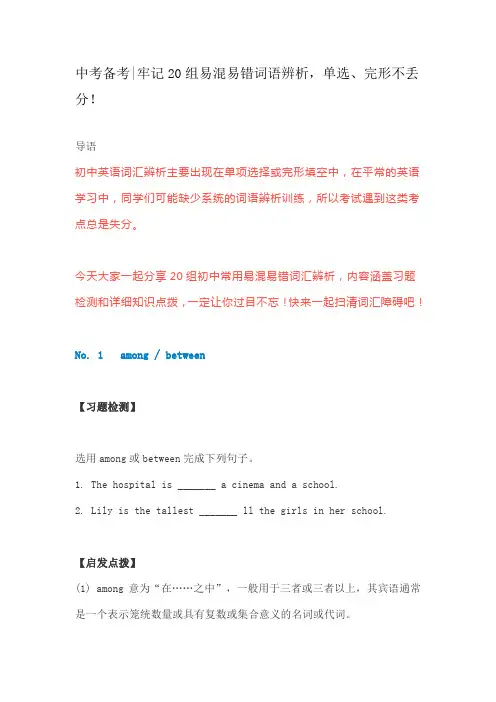
中考备考|牢记20组易混易错词语辨析,单选、完形不丢分!导语初中英语词汇辨析主要出现在单项选择或完形填空中,在平常的英语学习中,同学们可能缺少系统的词语辨析训练,所以考试遇到这类考点总是失分。
今天大家一起分享20组初中常用易混易错词汇辨析,内容涵盖习题检测和详细知识点拨,一定让你过目不忘!快来一起扫清词汇障碍吧!No. 1 among / between【习题检测】选用among或between完成下列句子。
1. The hospital is _______ a cinema and a school.2. Lily is the tallest _______ ll the girls in her school.【启发点拨】(1) among意为“在……之中”,一般用于三者或三者以上,其宾语通常是一个表示笼统数量或具有复数或集合意义的名词或代词。
(2) between一般指两者之间,其宾语通常是表示两者概念的名词或代词,或由and连接的两个具体的人或物。
between有时也可表示多者之中的“两两之间”。
如:Switzerland lies between France, Germany, Austria and Italy.Key:1. between2. amongNo. 2 lay / lie【习题检测】用lay或lie的适当形式完成句子。
1. I _______ the table when my mother cooked the meal.2. John was ill and _______ in bed all morning.【启发点拨】(1) lay作动词,可意为“摆放(餐桌)”,其过去式与过去分词均为laid,现在分词为laying,常用于短语lay the table,意为“摆放餐桌”。
如:Tom was laying the table.(2) lie作动词,意为“躺;平躺”时,过去式为lay,过去分词为lain,现在分词为lying。
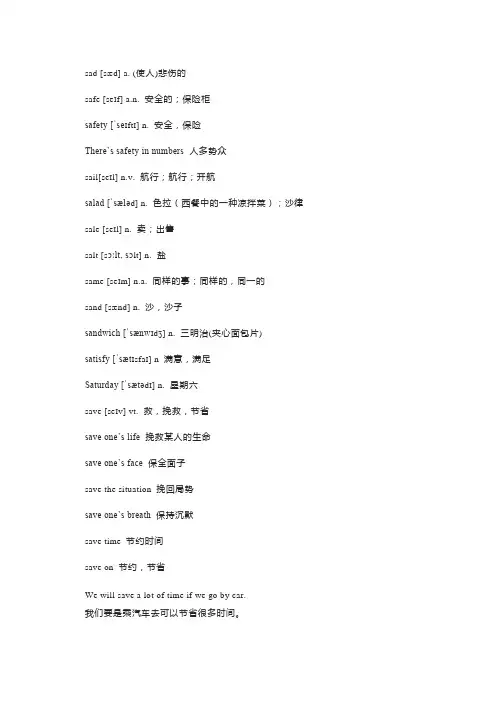
sad [sæd] a. (使人)悲伤的safe [seɪf] a.n. 安全的;保险柜safety [ˈseɪftɪ] n. 安全,保险There’s safety in numbers 人多势众sail[seɪl] n.v. 航行;航行;开航salad [ˈsæləd] n. 色拉(西餐中的一种凉拌菜);沙律sale [seɪl] n. 卖;出售salt [sɔːlt, sɔlt] n. 盐same [seɪm] n.a. 同样的事;同样的,同一的sand [sænd] n. 沙,沙子sandwich [ˈsænwɪdʒ] n. 三明治(夹心面包片)satisfy [ˈsætɪsfaɪ] n 满意,满足Saturday [ˈsætədɪ] n. 星期六save [seɪv] vt. 救,挽救,节省save one’s life 挽救某人的生命save one’s face 保全面子save the situation 挽回局势save one’s breath 保持沉默save time 节约时间save on 节约,节省We will save a lot of time if we go by car.我们要是乘汽车去可以节省很多时间。
say(said, said) [seɪ] vt. 说,讲go without saying 显而易见say to oneself 自言自语scarf[skɑːf] n. 领巾;围巾school [skuːl] n. 学校schoolbag['sku:lbæg] n. 书包science [ˈsaɪəns] n. 科学,自然科学scientist[ˈsaɪəntɪst] n. 科学家scissors [ˈsɪzəz] n. 剪刀score [skɔː(r)] n.&v. 得分;分数a score-keeper 记分员a score –sheet 记分单a score of 二十个screen [skriːn] n. 幕,荧光屏sea[siː] n. 海,海洋in the sea 在海里on the sea 在海滨by sea 乘船a sea of flames 一片火海search [sɜːtʃ] n.&v. 搜寻,搜查search for sb/sth 寻找某人/某物Rescue workers searched all night in the hope of finding more survivors.营救人员彻夜搜寻,希望找到更多的幸存者。
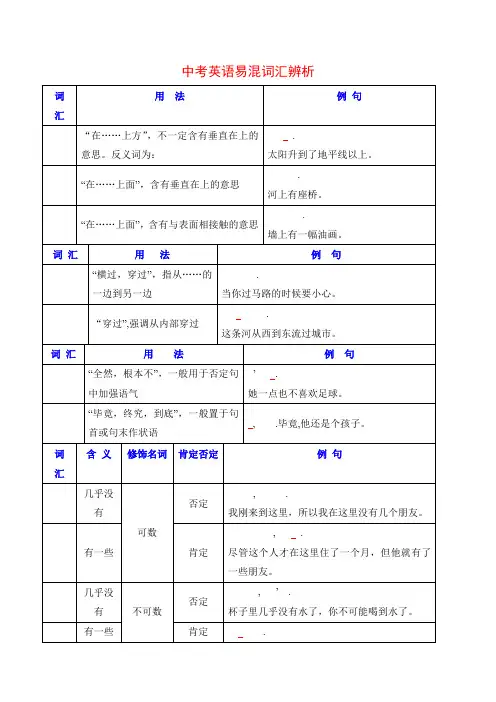
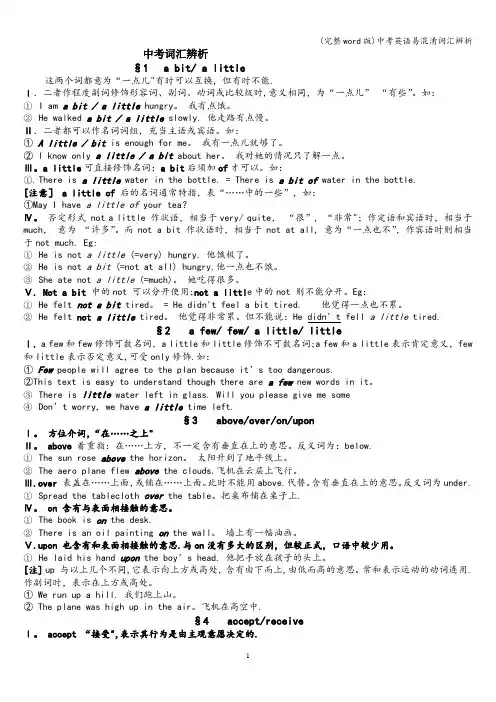
中考词汇辨析§1 a bit/ a little这两个词都意为“一点儿"有时可以互换,但有时不能.Ⅰ.二者作程度副词修饰形容词、副词、动词或比较级时,意义相同,为“一点儿”“有些”。
如:①I am a bit / a little hungry。
我有点饿。
②He walked a bit / a little slowly. 他走路有点慢。
Ⅱ.二者都可以作名词词组,充当主语或宾语。
如:①A little / bit is enough for me。
我有一点儿就够了。
② I know only a little / a bit about her。
我对她的情况只了解一点。
Ⅲ。
a little可直接修饰名词;a bit后须加of才可以。
如:①.There is a little water in the bottle. = There is a bit of water in the bottle.[注意] a little of后的名词通常特指,表“……中的一些”,如:①May I have a little of your tea?Ⅳ。
否定形式 not a little 作状语,相当于very/ quite,“很”, “非常";作定语和宾语时,相当于much,意为“许多”。
而not a bit 作状语时,相当于not at all, 意为“一点也不”,作宾语时则相当于not much. Eg:①He is not a little (=very) hungry. 他饿极了。
②He is not a bit (=not at all) hungry.他一点也不饿。
③She ate not a little (=much)。
她吃得很多。
Ⅴ. Not a bit中的not 可以分开使用;not a littl e中的not 则不能分开。
Eg:①He felt not a bit tired。
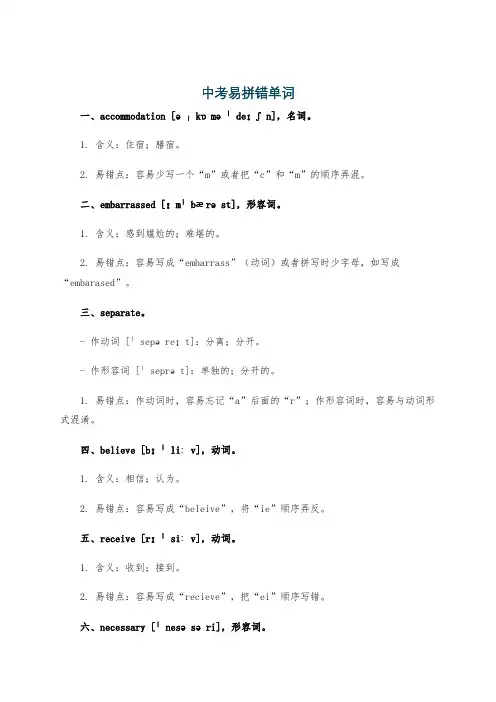
中考易拼错单词
一、accommodation [əˌkɒməˈdeɪʃn],名词。
1. 含义:住宿;膳宿。
2. 易错点:容易少写一个“m”或者把“c”和“m”的顺序弄混。
二、embarrassed [ɪmˈbærəst],形容词。
1. 含义:感到尴尬的;难堪的。
2. 易错点:容易写成“embarrass”(动词)或者拼写时少字母,如写成“embarased”。
三、separate。
- 作动词 [ˈsepəreɪt]:分离;分开。
- 作形容词 [ˈseprət]:单独的;分开的。
1. 易错点:作动词时,容易忘记“a”后面的“r”;作形容词时,容易与动词形式混淆。
四、believe [bɪˈliːv],动词。
1. 含义:相信;认为。
2. 易错点:容易写成“beleive”,将“ie”顺序弄反。
五、receive [rɪˈsiːv],动词。
1. 含义:收到;接到。
2. 易错点:容易写成“recieve”,把“ei”顺序写错。
六、necessary [ˈnesəsəri],形容词。
1. 含义:必要的;必需的。
2. 易错点:容易写成“neccessary”,多写一个“c”。
七、government [ˈɡʌvənmənt],名词。
1. 含义:政府。
2. 易错点:容易写成“goverment”,少写一个“n”。
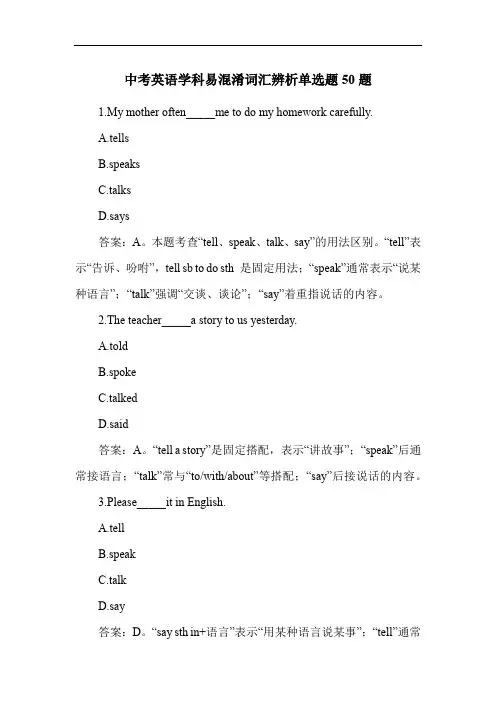
中考英语学科易混淆词汇辨析单选题50题1.My mother often_____me to do my homework carefully.A.tellsB.speaksC.talksD.says答案:A。
本题考查“tell、speak、talk、say”的用法区别。
“tell”表示“告诉、吩咐”,tell sb to do sth 是固定用法;“speak”通常表示“说某种语言”;“talk”强调“交谈、谈论”;“say”着重指说话的内容。
2.The teacher_____a story to us yesterday.A.toldB.spokeC.talkedD.said答案:A。
“tell a story”是固定搭配,表示“讲故事”;“speak”后通常接语言;“talk”常与“to/with/about”等搭配;“say”后接说话的内容。
3.Please_____it in English.A.tellB.speakC.talkD.say答案:D。
“say sth in+语言”表示“用某种语言说某事”;“tell”通常后面接人;“speak”后接语言;“talk”强调交谈。
4.Don't_____loudly in the library.A.tellB.speakC.talkD.say答案:C。
“talk loudly”表示“大声交谈”;“tell”后面接人;“speak”一般不与“loudly”搭配;“say”强调说话的内容。
5.She can_____Japanese very well.A.tellB.speakC.talkD.say答案:B。
“speak+语言”表示“说某种语言”;“tell”后面接人;“talk”强调交谈;“say”后接说话的内容。
6.She is a ______ girl and always helps others.A.kindB.cruelC.selfishzy答案:A。
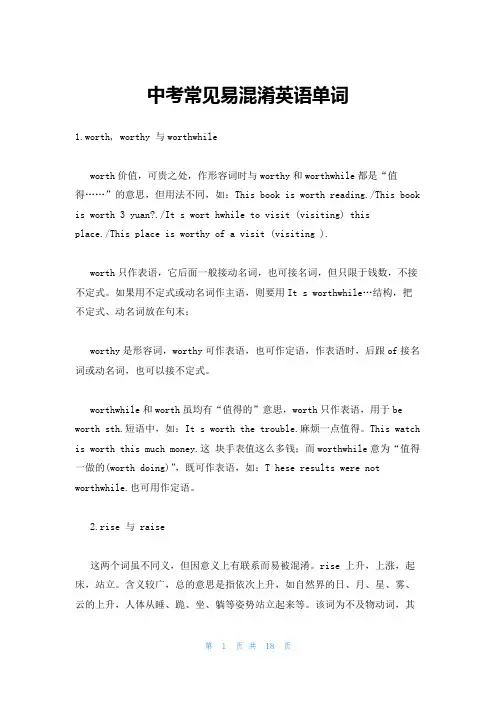
中考常见易混淆英语单词1.worth, worthy 与worthwhileworth价值,可贵之处,作形容词时与worthy和worthwhile都是“值得……”的意思,但用法不同,如:This book is worth reading./This book is worth 3 yuan?./It s wort hwhile to visit (visiting) thisplace./This place is worthy of a visit (visiting ).worth只作表语,它后面一般接动名词,也可接名词,但只限于钱数,不接不定式。
如果用不定式或动名词作主语,则要用It s worthwhile…结构,把不定式、动名词放在句末;worthy是形容词,worthy可作表语,也可作定语,作表语时,后跟of接名词或动名词,也可以接不定式。
worthwhile和worth虽均有“值得的”意思,worth只作表语,用于be worth sth.短语中,如:It s worth the trouble.麻烦一点值得。
This watch is worth this much money.这块手表值这么多钱;而worthwhile意为“值得一做的(worth doing)”,既可作表语,如:T hese results were not worthwhile.也可用作定语。
2.rise 与 raise这两个词虽不同义,但因意义上有联系而易被混淆。
rise 上升,上涨,起床,站立。
含义较广,总的意思是指依次上升,如自然界的日、月、星、雾、云的上升,人体从睡、跪、坐、躺等姿势站立起来等。
该词为不及物动词,其过去式与过去分词分别是rose 和 risen。
例如:The sun rises in the east and sets in the west.日出于东而落于西。
/ Prices rise every day in those countries.那些国家里的物价天天上涨。
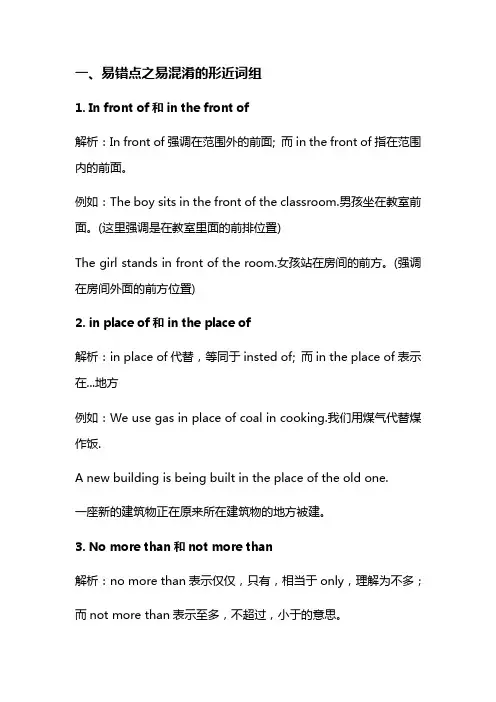
一、易错点之易混淆的形近词组1.In front of和in the front of解析:In front of强调在范围外的前面; 而in the front of指在范围内的前面。
例如:The boy sits in the front of the classroom.男孩坐在教室前面。
(这里强调是在教室里面的前排位置)The girl stands in front of the room.女孩站在房间的前方。
(强调在房间外面的前方位置)2.in place of和in the place of解析:in place of代替,等同于insted of; 而in the place of表示在...地方例如:We use gas in place of coal in cooking.我们用煤气代替煤作饭.A new building is being built in the place of the old one.一座新的建筑物正在原来所在建筑物的地方被建。
3.No more than和not more than解析:no more than表示仅仅,只有,相当于only,理解为不多;而not more than表示至多,不超过,小于的意思。
例如:He is no more than an ordinary English teacher. 他只不过是个普通的英文老师。
He has not more than three children. 他最多3 个孩子(有或许还不到三个)4.On earth和on the earth解析:两者都有在地上,在地球上的意思,但on earth还有到底,究竟的意思;On the earth只是单纯的表示在地上,在地球上例如:where on earth did you spring from?你究竟从哪里冒出来的?What if there was no lead on the earth at all?如果地球上根本就没有铅这种物质怎么办?5.At all和after all解析:at all表示根本,全然的意思,常用短语not at all表示一点也不;after all表示到底,毕竟的意思例如:I don't know him at all. 我根本不认识他。
初三英语词汇辨析常见错误在初三英语的学习中,词汇辨析是一个重要的部分,但同学们在这方面常常会出现一些错误。
以下是一些常见的错误类型及分析。
一、混淆近义词很多同学容易将意思相近的单词用错,比如“alone”和“lonely”。
“alone”侧重于“独自一人”,表示客观上的状态;而“lonely”则侧重于“孤独的、寂寞的”,更多地表达一种主观感受。
例如:He was alone in the room(他独自一人在房间里。
)He feels lonely because he has no friends (他感到孤独,因为他没有朋友。
)再比如“take”“bring”和“fetch”。
“take”表示“带走、拿走”,是把某物从说话者所在的地方带到别的地方;“bring”表示“带来、拿来”,是把某物从别的地方带到说话者所在的地方;“fetch”则表示“去取来、去拿来”,强调一个往返的动作。
例如:Take this book to the library(把这本书带到图书馆去。
)Bring me a cup of coffee(给我拿一杯咖啡来。
)Please fetch my bag from the classroom(请从教室把我的包拿来。
)二、忽略词汇的词性有些单词虽然拼写相同,但词性不同,意思和用法也不同。
比如“interest”这个词,既可以作名词,表示“兴趣”,也可以作动词,表示“使感兴趣”。
例如:My interest is reading(名词,我的兴趣是阅读。
)This book interests me(动词,这本书使我感兴趣。
)再如“success”是名词,“succeed”是动词,“successful”是形容词。
我们要说“He succeeded in the exam”(他考试成功了。
)而不能说“He successed in the exam”三、误解短语动词的含义短语动词也是同学们容易出错的地方。
初中英语易混淆的词语辨析第一组spend/take/cost① 花费的主题通常是“人”,即“某人花费了多少时间或金钱”例句:2)shespentlotsofmoneyonbookslastyear.(去年她花费很多钱在书本上。
)② 做某事需要多长时间1)howlongdoesittakeyoutofinishthework?(你需要多少时间才能完成那工作?)2)ittookmeanhourtorepairmybike.(我花了一个小时修理自行车。
)3)这让我们有足够的时间去了解真相。
说实话需要很大的勇气③cost的主语通常是事物,即指①某物值多少钱②需要多少时间③某人花了多少钱④使(某人)(丧失)(事/物)+cost+(人)+时间/金钱1)thewatchcostmetwohundredyuan.(这块手表花了我200块钱。
)2)写小说要花很多时间。
写小说要花很多时间3)thegirl'sbadbehaviorcostherparentsmanysleeplessnights.(那个女孩的不良行为使得她的父母许多夜晚睡不着。
)注意:cost的过去式,过去分词都是cost。
第二组:说/说/说/说①speak说某种语言,说某人好、坏话是及物动词;发表讲话,对某人说话,是不及物动词。
1)thestudentsspeakenglishveryfluently.(这些学生英语说得非常流利。
)2)总理就国际形势发表了讲话。
(首相就国际形势发表了讲话。
)3)她总是会说话。
她总是说别人的坏话② 一般来说,坦率地说,坦率地说,严格地说,严格地说,不说;更不用说1)generallyspeaking,manisstrongerthanwoman.(一般而言,男人比女人强壮。
)2)我们会说英语,不会说汉语。
我们能读英语,更不用说中文了④say说出某句话或某件事;后接从句,(但say与从句之间不能直接接人称代词或名词);说明时间;书信、布告报纸上的“说”,习惯用法1)shesaid,“iloveyou.”(她说:“我爱你。
初中英语常见易混词汇辨析在初中英语的学习中,同学们常常会遇到一些容易混淆的词汇,这些词汇在拼写、发音、词义或用法上有相似之处,给我们的理解和运用带来了一定的困难。
下面就为大家详细辨析一些常见的易混词汇。
一、“a”和“an”“a”和“an”都属于不定冠词,用于泛指一个人或事物。
“a”用于以辅音音素开头的单词前,“an”用于以元音音素开头的单词前。
需要注意的是,这里所说的“元音音素”和“辅音音素”指的是读音,而不是字母。
例如,“a book”(一本书),“an apple”(一个苹果)。
“hour”(小时)这个单词虽然以“h”开头,但“h”不发音,它的读音是以元音音素开头,所以应该说“an hour”。
二、“alone”和“lonely”“alone”表示“独自的,单独的”,侧重于指客观上的独自一人,没有同伴。
“lonely”则表示“孤独的,寂寞的”,侧重于指主观上感到孤独、寂寞,带有感情色彩。
例如,“He lives alone but he doesn't feel lonely”(他独自生活,但并不感到孤独。
)三、“bring”和“take”“bring”意为“带来,拿来”,指把某物从别处带到说话者所在的地方。
“take”意为“拿走,带走”,指把某物从说话者所在的地方带到别处。
例如,“Bring your book here”(把你的书带到这儿来。
)“Take this bag to your room”(把这个包拿到你的房间去。
)四、“in front of”和“in the front of”“in front of”表示“在……前面”,指在某个物体外部的前面。
“in the front of”也表示“在……前面”,但指在某个物体内部的前面。
例如,“There is a tree in front of the house”(房子前面有一棵树。
)“The driver is sitting in the front of the bus”(司机坐在公共汽车的前部。
中考英语易混词汇辨析1. clothes, cloth, clothingclothes统指各种衣服,谓语动词永远是复数cloth指布,为不可数名词clothing服装的总称,指一件衣服用a piece of, an article of2. incident, accidentincident指小事件, accident指不幸的事故He was killed in the accident.3. amount, numberamount后接不可数名词,number后接可数名词 a number of students4. sound, voice, noisesound自然界各种各样的声音,voice人的嗓音,noise噪音I hate the loud noise outside.5. photo, picture, drawingphoto用照相机拍摄的照片,picture可指相片,图片,电影片,drawing画的画Let's go and see a good picture.6. weather, climateweather一天内具体的天气状况,climate长期的气候状况The climate here is not good for you.7. road, street, path, wayroad具体的公路,马路,street街道,path小路,小径,way道路,途径take this road; in the street, show me the way to the museum.8. course, subjectcourse课程(可包括多门科目),subject科目(具体的学科)a summer course9. custom, habitcustom传统风俗,习俗,也可指生活习惯,后接to do,habit生活习惯,习惯成自然,后接of doing.I've got the habit of drinking a lot.10. cause, reasoncause指造成某一事实或现象的直接原因,后接of sth./doing sth,reason用来解释某种现象或结果的理由,后接for sth./doing sth. the reason for being late11. exercise, exercises, practiceexercise运动,锻炼(不可数),exercises练习(可数),practice(反复做的)练习Practice makes perfect.12. class, lesson作"课"解时,两者可以替换.指课文用lesson.指班级或全体学生用class. lesson 6; class 513. speech, talk, lecturespeech指在公共场所所做的经过准备的较正式的演说,talk日常生活中的一般的谈话,讲话,lecture学术性的演讲,讲课 a series of lecture on…14. work, job二者均指工作。
中考英语易混淆词汇辨析
中考英语考试中,易混淆词汇的辨析是一个常见的题型。
这些词汇在拼写、词义或用法上有一定的相似之处,容易让学生迷惑。
深入了解这些易混淆词汇的差异和正确用法,对于提高中考英语分数具有重要意义。
本文将就几组常见易混淆词汇进行辨析,帮助同学们更好地理解和使用它们。
1. Accept和Except
Accept和Except是两个在书写和发音上非常相似的词汇,但在词义和用法上有着明显的区别。
Accept是一个动词,意为“接受”或“同意”。
例如:
(1) He accepted the invitation to the party.
(2) The seller accepted the buyer's offer.
Except是一个介词,意为“除了……之外”。
例如:
(1) Everyone attended the meeting except him.
(2) I like all fruits except oranges.
2. Affect和Effect
Affect和Effect也是一对常见的易混淆词汇,它们在音近上容易引起混淆,但它们的意义和用法却有明显差异。
Affect是一个动词,意为“影响”。
例如:
(1) The heavy rain affected the traffic.
(2) Lack of exercise can affect your health.
Effect既可以是名词,意为“效果”或“影响”,也可以是动词,意为“产生影响”。
例如:
(1) The medicine has a good effect on curing the disease.
(2) His speech effectively influenced the audience.
3. Advice和Advise
Advice是一个名词,意为“建议”或“忠告”。
例如:
(1) I need some advice on how to solve this problem.
(2) His advice helped me make a decision.
Advise是一个动词,意为“建议”。
例如:
(1) Can you advise me on how to improve my English?
(2) The doctor advised him to get more rest.
4. Principal和Principle
Principal和Principle在拼写和发音上非常相似,但它们的意义和用法有着明显差异。
Principal既可以是名词,意为“校长”,也可以是形容词,意为“主要的”或“最重要的”。
例如:
(1) The principal of our school is very strict.
(2) The principal reason for his success is hard work.
Principle是一个名词,意为“原则”或“原理”。
例如:
(1) He always sticks to his principles.
(2) The principle of this experiment is to test the hypothesis.
5. Past和Passed
Past和Passed在发音上非常相似,容易混淆。
但它们的词性和用法
存在差异。
Past可以是形容词或副词,意为“过去的”或“经过”。
例如:
(1) He lives in a house past the park.
(2) The past year has been challenging for me.
Passed是动词pass的过去式,意为“通过”或“经过”。
例如:
(1) He passed the exam with flying colors.
(2) She passed me on the street without saying hello.
以上是对中考英语易混淆词汇的辨析。
通过对这些词汇的正确理解
和运用,我们可以在中考英语考试中避免错误,提高得分。
希望同学
们能够认真学习并熟练掌握这些词汇的差异和正确用法,取得好成绩!。